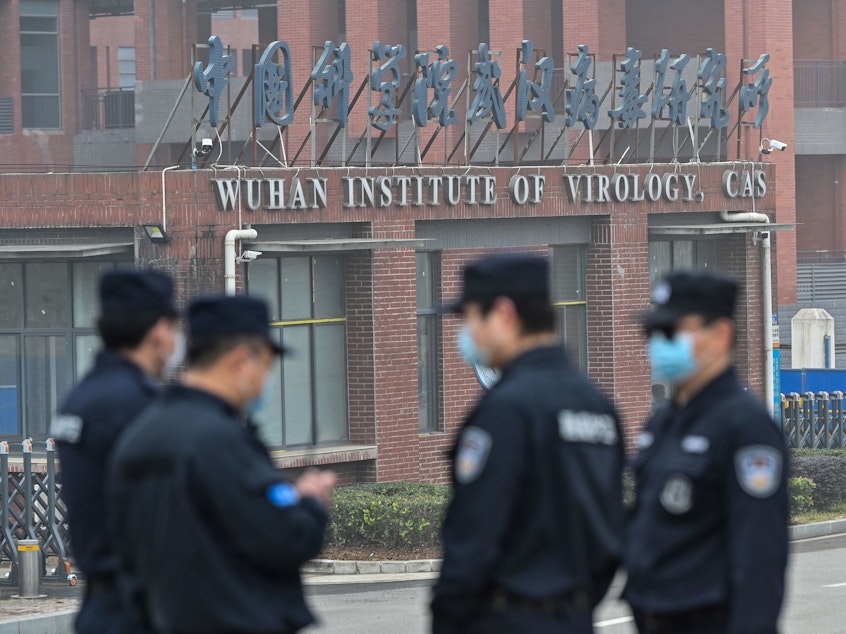Many Scientists Still Think The Coronavirus Came From Nature

This week, President Biden directed his intelligence agencies to take another look at whether the coronavirus resulted from a lab accident in China. For many, the announcement felt like a big change, putting what had been a conspiracy theory about the virus's origins back on the table.
But not much has changed for Robert Garry, a microbiologist at Tulane University who has analyzed the genome of the coronavirus. "Nothing's really tipped me or made me flip-flop or anything about it," he says. "I'm more convinced than ever that this is a natural virus."
Garry and many other scientists, including the President's chief medical adviser Anthony Fauci, continue to believe the preponderance of evidence points toward a natural source. That's been the case for every previous disease known to infect humans.
Nevertheless, this week's announcement has created room for what some researchers hope can be a more balanced discussion of the possibility of a laboratory accident. "I think it opens the door for other scientists to weigh in without being called conspiracy theorists," says Alina Chan, a geneticist at MIT's Broad Institute who has long argued for the laboratory theory to be more thoroughly considered.
A natural origin would be more in line with what's come in the past. "The historical basis for pandemics evolving naturally from an animal reservoir is extremely strong," Fauci told senators at a hearing earlier this week. Ebola, HIV and the major influenza viruses all came from nature, he said.
In the case of the SARS-CoV-2 virus, Garry sees parallels to another natural outbreak. Most of the first reported cases of this virus were in wet markets in the Chinese city of Wuhan. Wet markets were also central to the outbreak of the original SARS virus, which began spreading in the early 2000s.
Back then, the virus was traced quickly. "People got lucky," he says. "They were able to identify the restaurants the first cases ate at, and then go back to the wildlife farms where they'd bought the civets as it turns out." Those civets had been infected by bats.
The fact that nobody's pinpointed the source for the new coronavirus isn't particularly unusual, adds Garry. It can take years to figure out a source; the natural source of the Ebola virus remains a mystery, for example. But he thinks it's out there: "It's just a matter of time before we find the progenitor in a bat or some other species."
Ian Lipkin, at the Mailman School of Public Health at Columbia University, is another researcher who's taken a hard look at the genetics of this virus. He says that there's no evidence for human manipulation. In fact, the way the virus infects people is so quirky, he thinks it couldn't have been made in a lab.
"We would not have known how to design this virus, even if we had wanted to do so," he says. "When I say 'we,' I really do mean the scientific community, whether we mean scientists in Europe or the U.S. or China, for that matter."
But he adds, it is still possible that a scientist in China could have found the coronavirus in nature and that a lab accident ensued. "It's possible that the virus was brought into the laboratory, that it was grown inside a cell line, that somebody became infected and left the laboratory inadvertently and carried the virus with them."
The laboratory in question, the Wuhan Institute of Virology, has collected viruses from bats in the field and has published some of the genetic sequences. So far, none have matched SARS-CoV-2.
Nevertheless, "both scenarios are still on the table," says geneticist Chan. Chan says she herself hasn't reached any conclusions about whether a lab is responsible: "There's nothing that's a smoking gun," she says.
The intelligence community is also unsure. In a brief statement, the Office of the Director of National Intelligence said that the nation's intelligence agencies believed both a lab accident and a natural outbreak were possibilities.
Most agencies did not reach a conclusion, while two supported the natural cause theory and one the lab leak with "low/medium confidence." That could mean that the intel is based on just a few sources, or on sources that are unreliable, says Eric Brewer, a former National Security Council staffer now at the Center for Strategic and International Studies. "The bottom line is that there's a lot of uncertainty," he says.
Former President Trump frequently mentioned the lab leak theory without providing evidence, and Chan says that gave the discussion a political taint: "I was compared to insurrectionists and Qanon" for raising the possibility, she says.
She and other scientists had hoped a World Health Organization mission to China earlier this year might conduct a more serious examination of the theory. But it fell far short of her expectations because China obstructed investigators. "They always had to be chaperoned by people from the government, they were always being monitored," she says.
Chan was one of more than a dozen scientists who signed on to a letter in the journal Science calling for a more open look at the possibility the virus came from a lab. She welcomes the intelligence review that Biden ordered and believes it may be the only way, at this stage, to gather evidence on the origins of the coronavirus. "Will China suddenly become one of the most transparent countries on earth?" she says. "I cannot imagine how that will happen."
In the end, all three scientists agree that the available evidence is far from conclusive, and all welcome further investigation. The question of where the virus came from needs to be answered, says Chan. "Our lives depend on finding out how this virus got started," she says, "so we can prevent another one from getting started five to 10 years from now." [Copyright 2021 NPR]



